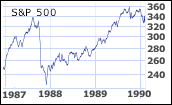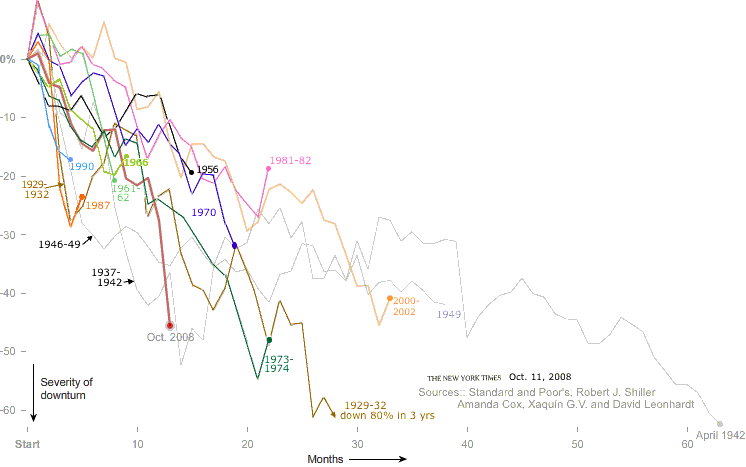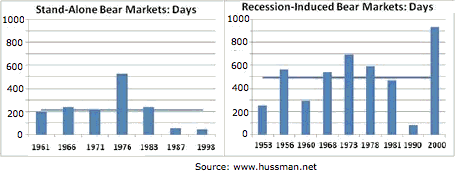Under Construction 
From 1950-2008 there have been 6 bear markets (Drop of > 20% lasting more than 10 mos.)
| Decline | Years |
| abt. 20% | 56-57, 61-62, 66 |
| 25-30% | 81-82, 87 |
| 30-40% | 70 |
| >40 | 73-34, 2000-02, 2008 |
% S&P drop
1929 Crash - 90%
1937-1942
1946-49 42% 22 mos. Recovery started 3 yrs. after peak.
1956-57 20% 1 yr.
1961-62 21% 8 mos.
1966 20% 10 mos.
1970 33% 20 mos. Inflation - Recession - Failure of DJIA to break 1,000
1973-74 48% 21 mos. Bear Market - Recession - 48%
1981-82 26% 21 mos. Bear Market - Recession - Discount rate - 14%
1987 30% 3 mos.
2000 45% 25 mos.
2008-09 51% 16 mos.- Financial mortgage/lending crisis
 1987 crash - 33% 3.4 mos.- As of 2005 no definite reason for the decline has been isolated.
At the time it was thought to warn of a impending recession, not it apears to have been caused by a new investment strategy involving stock index futures that led to major selling after the first decline. 1987 crash - 33% 3.4 mos.- As of 2005 no definite reason for the decline has been isolated.
At the time it was thought to warn of a impending recession, not it apears to have been caused by a new investment strategy involving stock index futures that led to major selling after the first decline.
See: lope.ca/markets/1987crash/
The 1987 Crash and the Performativity of Economics, Donald MacKenzie
1990 - Savings & loan scandal - 18% 3 mos.
1997 - Asian credit crisis, Russian default and problems with hedge fund, Long-Term Capital Management.
2000-02 Crash - .com bust, (Irrational exuberance) ... - 47% 2 yrs.
2007-08 Sub-prime mortgage defaults, housing bust


Recession and Bear Markets:
Many claim that historically stocks begin to rally 60% of the way through the recession.
Recessions:
* January-July 1980 and July 1981-November 1982: 2 years total
* July 1990-March 1991: 8 months
* November 2001-November 2002: 12 months
S&P change (%)
| Recession | 6 mos
before | drring
recession | 6 mos after |
| 12/69-11/70 | -8.9 | -11.3 | 20.5 |
| 11/73-3/75 | 1.1 | -24.7 | 6.5 |
| 1/80-11/80 | 5.8 | 5.8 | 18.8 |
| 7/81-11/82 | -3.8 | 1.9 | 23.0 |
| 7/90-3/91 | -0.5 | 2.5 | 7.7 |
| 3/01-11/01 | -18.3 | -8.1 | -6.3 |
Source: FundMasteryBlog.com
Bear markets usually start before an associated recession, however this not a cause-effect relation, but stocks are anticipating a business slowdown..
At Hussman Funds "Recessions and Stock Prices" they say:
Recession-induced bear markets tend to be longer, more drawn-out affairs. Stocks head lower over time as bad news continues to trickle out. The average length of recession-induced bear markets is 491 days, more than twice the duration of stand-alone bear markets.

Source: How This Bear Market Compares - NYTimes.com Oct. 11, 2008
Links:
10 Bear Markets: 1950–Present - Business Insider
Bear Market Statistics - Bob Brinker and
How Bearish Does The Stock Market Get During a Recession? by Nouriel Roubini | Sep 5, 2006.
See Market Volitility
Return to Investing
Send comments and suggestions to
last updated 29 Oct 2008
| 